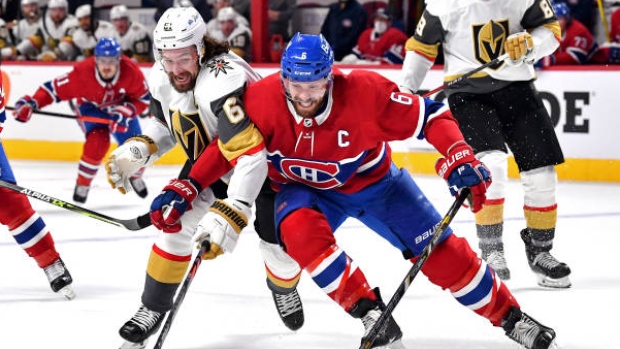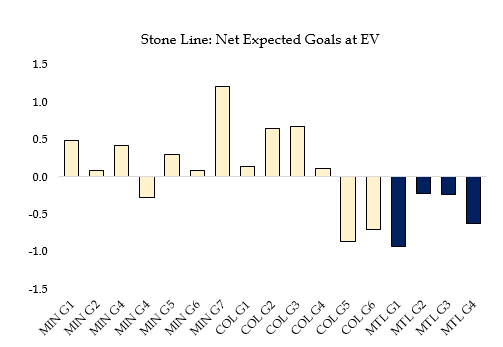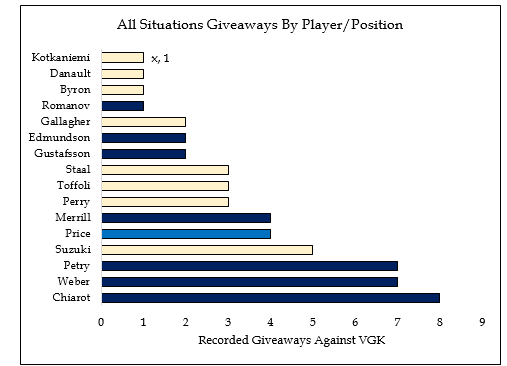Jun 22, 2021
Grading the Canadiens’ keys to engineering an upset
The Montreal Canadiens head into Game 5 against the heavily favoured Vegas Golden Knights with the series all even at 2-2. Travis Yost looks at the keys to the Habs pulling off the upset with what's working and what still needs improvement.
By Travis Yost

Breathe, Canadiens fans.
That is the best piece of advice I can give after what’s been a roller coaster of a series against the Vegas Golden Knights.
The series is tied two games apiece – that in and of itself is an accomplishment, particularly when you consider the betting markets gave Montreal very little chance. Not only have the Canadiens split the first four games, they’ve been competitive in the process, even outplaying the Golden Knights in their 2-1 overtime loss in Game 4 on Sunday night.
Before the puck dropped on this series, I figured Montreal had a chance to engineer an upset, but it was contingent on three crucial factors. As a refresher:
1. Minimizing the impact of the Golden Knights top line
2. Slowing down Vegas’ lethal forecheck
3. Carey Price providing a decisive goaltending advantage
Let’s grade out how the Canadiens have performed on each of these fronts, and what it might mean for their upset potential over the remainder of the series.
Minimizing the impact of the Golden Knights top line
Grade: A+
Mark Stone has zero points. Max Pacioretty, two lonely assists. Chandler Stephenson is injured. Not only has Vegas’ top line been wholly ineffective against a very capable defensive team in Montreal, they are at the heart of their team’s power play woes, too – a power play that’s converting on just 10 per cent of their opportunities this postseason.
Slowing this line is no small task. This line was three goals better than their opponents for every 60 minutes of even play during the regular season, driven largely by outstanding offensive production (5.2 goals scored per 60 minutes). You never expect that level of scoring to carry over to the postseason, but what Montreal’s checking lines have done to slow this group down is nothing short of extraordinary.
And their efficacy has been compounded with the loss of Stephenson. Tested replacements like Alex Tuch, Tomas Nosek and Keegan Kolesar have shown far less productive in the first-line centre role.
Montreal hasn’t generated much offence against them either – head-to-head scoring, Montreal is up just 3-2. But look at how much more time the Stone line is playing outside of the offensive zone, where they can forecheck and cycle teams to death. We will use expected goals here to neutralize the impacts of goaltending for the time being:

Much like the Stone line shadowed the Nathan MacKinnon line in Vegas’ prior series, Montreal has followed suit, using the indefatigable Philip Danault (54 per cent head-to-head usage) to slow down the best Golden Knights unit. Danault has already proven capable of shutting down all-world attackers in the past – his work against Auston Matthews in the first round is still front of mind for the Toronto Maple Leafs organization.
In this case, not only has Montreal turned off the scoring from Vegas’ top line, they have also forced them to play considerably more defence than they are accustomed to. That’s a big accomplishment.
It will be interesting to see if Montreal can sustain this dominance over the rest of the series, particularly with Stephenson’s return “on the horizon.” That’s a speed element Montreal hasn’t dealt with much in this series, and will certainly increase the difficulty of the task at hand.
Slowing down Vegas’ lethal forecheck
This is a bit of a mixed bag – Vegas’ forwards are having a whale of a time scoring, and Carey Price (more on him in a moment) has been the ultimate eraser.
But Vegas’ forecheck has been able to force turnovers in the offensive zone, applying relentless pressure on a stable of Canadiens blueliners who tend to be more comfortable defending the run of play than carrying the puck and sequencing the transition.
Turnover tracking in the NHL’s Real-Time Scoring System data can be a bit of a mess when it comes to data integrity, but if you use it for relative analysis only, you can draw two conclusions: most of the giveaways are coming from the Montreal blueline and most of those giveaways are happening in the defensive zone.
That’s indicative of pressure. And whereas you might expect a heavy puck handler like Jeff Petry to have more giveaways than the average defenceman, that shouldn’t be the case for players like Ben Chiarot or Shea Weber – a pairing that has struggled on this front and, through four games, owns 27 per cent of the recorded Montreal giveaways in this series.

If there is one area the Canadiens organization is a bit leery on over the first four games, this is probably it. Goal-scoring sequences for the Golden Knights have been impossible to come by, but they have been able to pressure Montreal’s skaters into turning the puck over. Lest we forget in Game 3: Marc-Andre Fleury’s all-time puckhandling gaffe was preceded by a brutal turnover from Eric Staal, gifting Nicolas Roy a goal.
Carey Price providing a decisive goaltending advantage
Grade: TBD
I know, I know. There is no doubt that Price has outplayed Fleury over the course of this series – Price has stopped 92.1 per cent of shots faced against Vegas, allowing 10 goals. Adjusting those shots for quality, Price should have already conceded 13 goals. I don’t need to remind you that three goals over four games is the definition of difference maker. He’s been sensational, full stop.
And while Fleury hasn’t been bad (91.1 per cent stop rate), his blow-up to end Game 3 forced head coach Peter DeBoer to make a difficult decision.
The decision to use Robin Lehner was criticized by some as a panic move heading into Game 4. Then Lehner outplayed Price, thwarting 27 shots and possibly stealing the starter’s job going forward.
Price is the reason Montreal is two games away from the Stanley Cup final. But this grade will be dictated by how this fascinating new goaltending matchup plays out.
Data via Natural Stat Trick, NHL.com, Hockey Reference, Evolving Hockey

